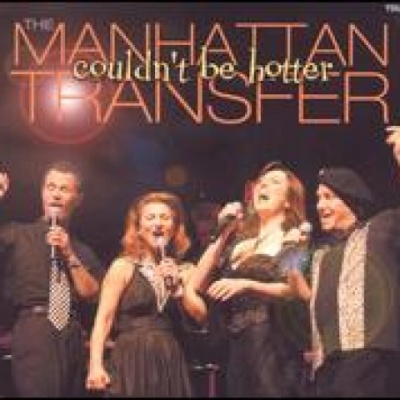
Couldn't Be Hotter
by Aaron Latham Although Manhattan Transfer have released other live albums, the collections were scattershot affairs that mainly focused on their '80s pop experiments or Vocalese-era jazz numbers that never really coalesced into one solid, perfectly performed concert recording. Twenty-eight years after their debut album, Manhattan Transfer finally capture the magic of their live performances on disc with the appropriately titled Couldn't Be Hotter. This generous 16-track collection, culled from concerts recorded at Tokyo's Orchard Hall in 2000, focuses on the pure vocal jazz that initially brought attention to the group back in the early '70s. With the exception of the 1980 pop hit "Twilight Zone/Twilight Tone," the Transfer load the program with jazz and swing selections, most of which were featured on their two studio releases Swing and Spirit of St. Louis. The quartet takes command of the stage immediately with Louis Armstrong's "Old Man Mose," as Tim Hauser leads a looser and more exciting version than the one heard on the 78 rpm-inspired Spirit of St. Louis. The Transfer have always been one of the most successful purveyors of vocalese (writing lyrics to fit previously recorded instrumental solos), and Cheryl Bentyne gives a fine example of this art as she deftly sings Jon Hendricks' lyrics in "Clouds," capturing almost every instrumental nuance of the original Django Reinhardt solo. Each member of the group is highlighted throughout the disc, but they truly come alive when working together as a vocal quartet, as on "Sing Moten's Swing," or when lively interacting with each other as they do throughout the Cajun-beat of "Stompin' at Mahogany Hall." What separates the Transfer from other similar jazz vocal groups is the fact that they utilize their voices as actual instruments instead of just singing, sometimes sounding like a solo muted trumpet or like a full saxophone section when vocalizing together. That is why they are at their peak when performing vocal jazz or jazz-related material instead of the pop music excursions that never really suited them well, like "Twilight Zone/Twilight Tone." Although a crowd-pleaser, the pop song detracts from the tone set by the preceding songs and features a half-hearted vocal effort as if it were an obligatory addition to the set list. However, that one minor flaw should not diminish the fact that, with its consistent theme, excellent pacing, and impeccable performances, Couldn't Be Hotter documents Manhattan Transfer at their vocal best.
